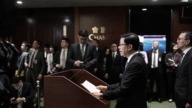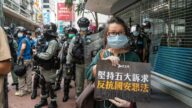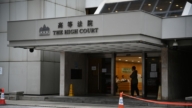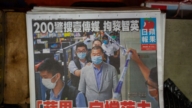【新唐人2014年06月26日讯】连日来,香港民众为争取民主发起的“6.22全民公投”运动,受到了海内外媒体的高度关注,尤其当公投的网上投票系统遭到了堪称“国际互联网史上第二大规模”的黑客攻击后,更是引发了舆论对幕后操纵者的种种猜测。香港互联网安全问题专家根据数据分析,公投网站所遭受的黑客攻击,有四成来自中资机构。公投组织者认为,黑客攻击的幕后黑手就是中共当局。
据香港媒体消息,截至6月24号下午7点,香港“和平占中”全民投票总人数已经超过73万5000人。尽管投票网站受到了大规模的黑客攻击,公投的电子投票数量仍然达到了近70万。
据报导,“和平占中”全民公投的电子平台,自6月20号接受电子投票开始,就持续受到“国家级”黑客疯狂的网络攻击。
为了力保投票系统能够正常运转,公投聘用了拥有超过150万客户的美国网络性能评估和安全服务公司“Cloud Flare”(云火炬)迎战黑客,这家公司总裁(Matthew Prince)在接受美国《华尔街日报》采访时形容,黑客无所有不用其极,手法极为成熟。他说:“他们几乎用尽书本上任何一种招数。有些招数,前所未见。”
“占中”运动发起人之一的“香港大学”法律学者戴耀廷表示,黑客采取的“分散式阻断服务攻击”(DDoS攻击),达到了至少每秒300GB的流量,而互联网自有记录以来,全世界最大规模的DDoS攻击是每秒400GB。可见,这次针对投票系统的攻击已经极为接近世界黑客攻击最高记录。
然而,这并不是黑客第一次对“占中”网站进行攻击。在此之前的6月13号,“占中”电子投票系统曾经向香港市民开放,进行预先登记模拟,仅24小时之内登记者就超过万人,但系统第二天就遭到了黑客强烈的DDoS攻击,导致公众无法登入。
网民大骂攻击者卑鄙的同时,黑客还对所有“.hk”的域名服务器进行了攻击,这令全香港网络流量从20号下午开始,变得异常缓慢,“香港大学民研投票系统”和很多带有.hk域名的网站都无法登入。这种攻击的规模,不只在香港历史上少见,更是全球罕见。
那么,究竟这些黑客来自什么地方?它们背后的操作者是谁?目地又是为了什么?
公投的网络保安顾问、香港互联网协会网络保安及私隐小组召集人杨和生,23号公开指出,经初步分析,公投系统在6月13号到14号预先登记阶段所受到的猛烈攻势,有大约三到四成的网际网路IP(地址),来自与中资机构有关的网络服务供应商。
加拿大全球信息自由网创办人张新宇:“共产党里面也有一些比较有眼光的人,实际上从上个世纪,90年代就开始弄网络攻击、黑客、病毒这些东西。因为我当时也教过在广州有一个自动化指挥师里面军人的电脑,当时他们请我去,我就了解了这些事儿。”
公投组织者对《法新社》表示:“我们有合理的理由认为,北京是幕后黑手,什么样的部门能够拥有这样的资源和动机?……这次袭击的规模在香港是史无前例的。”
张新宇:“因为中共它自己也知道自己政权的本性是一个独裁政权,一讲起‘民’这个字,它就很敏感,因为它是反民主的嘛! 因为它知道香港搞民意这样的活动一定会影响到中国大陆,那么它必然会采取一切手段的。其中一切手段里面就包括黑客攻击。它自己认为这是它经过很长时间,20年的打造,打造出这么一个所谓保护它自己的武器。”
旅居加拿大温哥华的“全球信息自由网”创办人张新宇表示,互联网的自然属性就是要“开放互联”,而中共逆自然规律而行,利用黑客频繁发动网络攻击,试图改变民意,这样作的结果,也只会适得其反。
采访编辑/张天宇 后制/李勇
Beijing Behind Cyber Attacks on Hong Kong Poll?
June 22, Hong Kong movement for democracy’s referendum,
faced the second largest cyber attack in history.
While the public suspect the ‘herder’ behind the attack,
Hong Kong Internet security experts analyzed,
40% of the attacks came from Chinese-funded institutions.
Referendum organizers believe that the Communist regime
was directing the attack.
By 19:00 hours June 24, more than 735,000 people participated
in the Occupy Central referendum, reported Hong Kong media.
Nearly 700,000 electronic votes were registered,
in spite of massive cyber attacks on June 20th
CloudFlare, the web performance and security service
for more than 1.5 million websites, was tasked to protect
the online polling system.
Matthew Prince, CEO of CloudFlare, told Wall Street
Journal, the online assault was ‘one of the largest and most
sophisticated’ attacks in Internet history.
Benny Tai, an organizer of Occupy Central, indicated
the hackers used a distributed denial-of-service attack
(DDoS), which generated 300 gigabytes (GB)
per second of traffic, only second to the largest attack
in history at 400 GB per second.
Occupy Central had experienced a cyber attack
on June 13 when pre-registration was initiated.
In 24 hours, more than 10,000 Hong Kongers logged on.
However, the system went down the next day
due to a severe DDoS attack.
Meanwhile, all domain names ‘.hk’ were also under attack.
Internet traffic was seriously jammed from the afternoon
of June 20.
Including the referendum website Popvote.hk, many websites
containing .hk domain were down.
The scale of the attack was rare in Hong Kong and the world.
Where did these hackers come from?
Who is the operator behind them?
What is the purpose of the attack?
Sang Young, referendum cyber security consultant, announced
on June 23 that preliminary analysis of attacks
in the pre-registration on June 13 and 14 showed 40% of IP
addresses were associated with Chinese-funded institutions,
reported Voice of America.
Zhang Xinyu, founder of Global Information Freedom
Movement website:"There are some people in the Communist Party
who had the foresight.
In fact, since the 1990s, they have engaged
in using cyber attacks, hackers and viruses.
I was teaching computing to the automation command
division of the military in Guangzhou.
I learned the fact at that time."
According to AFP, the referendum organizer believed
the large-scale attack could only have been carried out
by Beijing, based on resources, motivation and severity.
Zhang Xinyu: “The Communist regime is aware of its own
dictatorship.
Democracy is a sensitive term to the regime.
The democratic activity in Hong Kong will surely affect China.
It will use all means, including hacking, which took 20 years
to build, to protect its power."
Zhang Xinyu indicates the nature of the Internet is to allow
people to connect freely.
The Communist regime is fighting against the law of nature
by launching cyber attacks.
The CCP’s intention to change public opinion
will only be counterproductive.
Interview & Edit/Zhang Tianyu Post-Production/LiYong




























